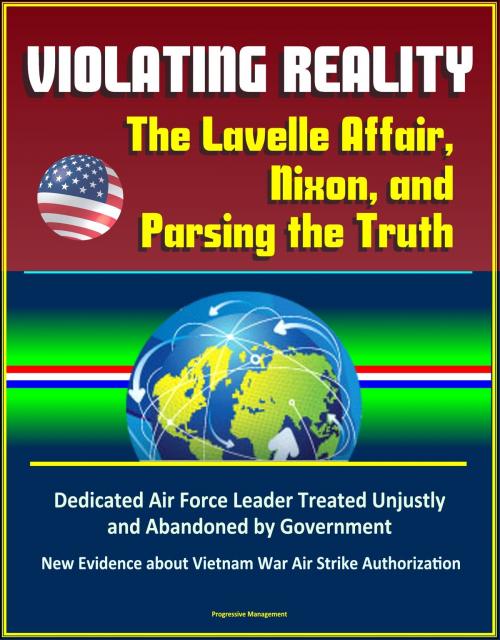Violating Reality: The Lavelle Affair, Nixon, and Parsing the Truth - Dedicated Air Force Leader Treated Unjustly and Abandoned by Government, New Evidence about Vietnam War Air Strike Authorization
Nonfiction, History, Military, Vietnam War, Asian, Aviation| Author: | Progressive Management | ISBN: | 9781370453986 |
| Publisher: | Progressive Management | Publication: | January 21, 2017 |
| Imprint: | Smashwords Edition | Language: | English |
| Author: | Progressive Management |
| ISBN: | 9781370453986 |
| Publisher: | Progressive Management |
| Publication: | January 21, 2017 |
| Imprint: | Smashwords Edition |
| Language: | English |
This excellent report has been professionally converted for accurate flowing-text e-book format reproduction. On December 20, 2010, the Senate Armed Services Committee (SASC) denied the Pentagon's request, endorsed by President Barack Obama, to advance posthumously Air Force Maj Gen John D. Lavelle to the retired list in the rank of general.1 Thirty-eight years earlier, Air Force Chief of Staff Gen John D. Ryan had fired the four-star Lavelle as the Seventh Air Force commander in Saigon for allegedly conducting unauthorized airstrikes against North Vietnam and ordering the falsification of mission reports. Senate hearings in September 1972 deemed Lavelle guilty of both offenses, resulting in his demotion to major general following retirement. Yet a careful reading of documentary and taped evidence, much of it recently discovered and not available at the time of the original Senate hearings, reveals that General Lavelle neither violated the rules of engagement (ROE) that prescribed America's air war at the time of his dismissal nor falsified mission reports. Accordingly, Lavelle should have his rank restored, and the so-called Lavelle affair should serve as a cautionary tale for political and military leaders alike who question the proper conduct of "civil-military relations" in the complex and often confounding era of modern limited war.
The case study that follows is not only an effort to help exonerate Lavelle for the unjust treatment he received, but it also reveals much about how American civil-military relations can function during a controversial limited conflict in which disparate personalities often played a dominant role. By the time of the Lavelle affair, the Vietnam War had cost the United States more than 50,000 Americans killed and exceeded $125 billion in monetary expenditures— enormous outlays in both lives and treasure for no tangible result after 7 years of combat.
Foreword * Acknowledgments * Introduction * Background * Initial "Unauthorized" Strikes * Appeals for "Liberal" ROE Interpretations * The Moc Chau Radar Attack * Netting of North Vietnam's Radars * The Dong Hoi Mission and Allegations of Falsified Records * "Mad Bomber" Nixon Secretly Changes the ROE * Lavelle's Relief from Command - and Nixon's Reaction * Judging the Truth * Assessment and Legacy * Footnotes
This excellent report has been professionally converted for accurate flowing-text e-book format reproduction. On December 20, 2010, the Senate Armed Services Committee (SASC) denied the Pentagon's request, endorsed by President Barack Obama, to advance posthumously Air Force Maj Gen John D. Lavelle to the retired list in the rank of general.1 Thirty-eight years earlier, Air Force Chief of Staff Gen John D. Ryan had fired the four-star Lavelle as the Seventh Air Force commander in Saigon for allegedly conducting unauthorized airstrikes against North Vietnam and ordering the falsification of mission reports. Senate hearings in September 1972 deemed Lavelle guilty of both offenses, resulting in his demotion to major general following retirement. Yet a careful reading of documentary and taped evidence, much of it recently discovered and not available at the time of the original Senate hearings, reveals that General Lavelle neither violated the rules of engagement (ROE) that prescribed America's air war at the time of his dismissal nor falsified mission reports. Accordingly, Lavelle should have his rank restored, and the so-called Lavelle affair should serve as a cautionary tale for political and military leaders alike who question the proper conduct of "civil-military relations" in the complex and often confounding era of modern limited war.
The case study that follows is not only an effort to help exonerate Lavelle for the unjust treatment he received, but it also reveals much about how American civil-military relations can function during a controversial limited conflict in which disparate personalities often played a dominant role. By the time of the Lavelle affair, the Vietnam War had cost the United States more than 50,000 Americans killed and exceeded $125 billion in monetary expenditures— enormous outlays in both lives and treasure for no tangible result after 7 years of combat.
Foreword * Acknowledgments * Introduction * Background * Initial "Unauthorized" Strikes * Appeals for "Liberal" ROE Interpretations * The Moc Chau Radar Attack * Netting of North Vietnam's Radars * The Dong Hoi Mission and Allegations of Falsified Records * "Mad Bomber" Nixon Secretly Changes the ROE * Lavelle's Relief from Command - and Nixon's Reaction * Judging the Truth * Assessment and Legacy * Footnotes















